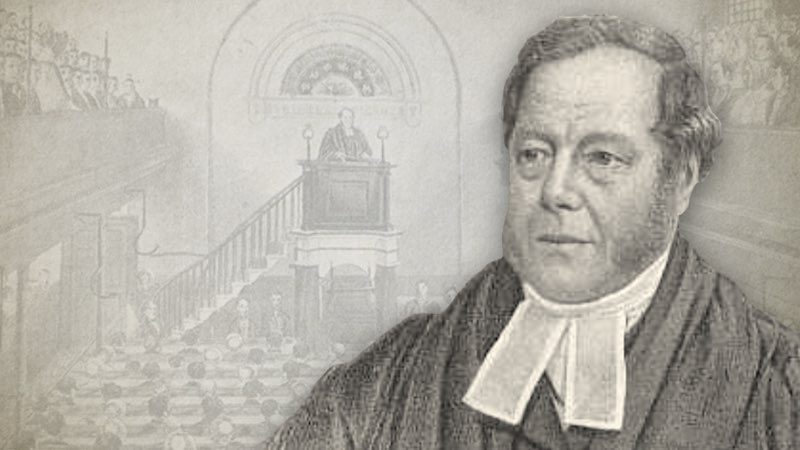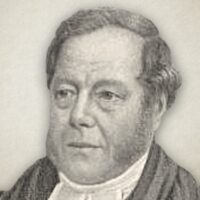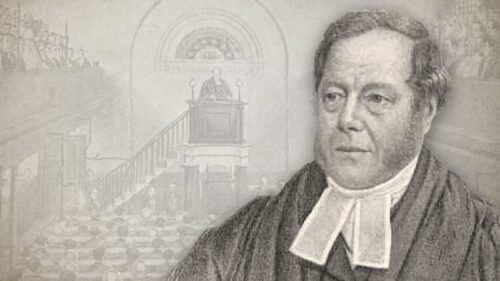
Letter 7: To Olympas—On Sanctification
My dear Olympas,
The God of Israel is the God of order, and all the works of creation— the mysteries of providence and the wonders of grace are conspicuous monuments of this interesting fact. There is an important connection between the parts of creation— an undisturbed order in the movements of providence and a holy harmony in the doctrines of grace.
The doctrine of sanctification shines bright in the constellation of gospel truths, and on account of its peculiar brightness, shedding its sacred lustre over all the inspired page, as the glory of the whole scheme of redemption, Satan has done all in his power to becloud it, and has often furnished men with discoloured mediums of viewing it, so as to effect his malicious purpose by distracting them, on the one hand with legal anxieties, or on the other, (which is worse,) betraying them into carelessness of life, if not into open licentiousness.
My anxious wish is, to conduct my dear young friend into a scriptural and clear view of this important doctrine, that he may avoid both the rock and the quicksand to which I have alluded, and sail on before a prosperous gale of divine influence to the port of eternal bliss.
Taking the word of God as my infallible directory I learn that the sanctification of the household of faith has three distinct parts or features, ascribed distinctly to the three persons of the Deity.
The apostle Jude writes, “to them that are sanctified by God the Father,” by which I apprehend is meant, the sovereign act of God the Father setting them apart from eternity to holy uses and ends; so that all the spirituality, holiness and usefulness with which they are honored in time, is in consequence of this eternal appointment of the Father, and cannot fail to be accomplished in them, because God the Father has set them apart in his own eternal mind for it, and will not allow himself to be disappointed: with this agrees the sentiment of the psalmist, “know that the Lord hath set apart him that is godly for himself.”
Thus also, the apostle Paul ascribes our sanctification to the will of God the Father, “by the which will, we are sanctified through the offering of the body of Christ, once for all:” here we see, that even the offering of the body of Christ, is in consequence of the Father having set apart a peculiar people for himself, and the very same will which Jesus came to do, is said to be the source of our sanctification, Heb. 10:10. and in exact accordance with this view of the subject, the same apostle exclaims, “this is the will of God; even your sanctification.”
Still keeping upon scripture ground, I find the saints are said to be sanctified in Christ Jesus, 1 Cor. 1:2. and that the Father has made him unto us, wisdom, righteousness, SANCTIFICATION, and redemption.”
Connect with these important statements, the declaration of the Saviour, that the Father sanctified HIM before he sent him into the world, John 10:36, and it will I think appear plain, that the saints were set apart in Christ, when he was set apart or appointed to his great work in the council of peace, and that they were viewed complete and holy in him from eternity.
Thus far I have considered sanctification as a covenant blessing, prepared for the family of God in their covenant head, before time began. If I were to stop here I might gratify men of corrupt minds, but I know I should disappoint and grieve my dear Olympas; I will therefore proceed to shew, what this blessing is as communicated to the redeemed of the Lord, of which they are all made the happy recipients in the fulness of time.
Here again the word of God affords infallible direction for our minds, and brings in the office and work of the Holy Spirit. Both Paul and Peter inform us, that we are chosen unto salvation, “through sanctification of the Spirit,” and I know of no way to ascertain our election of God the Father, and our justification by Christ, but by the sanctification of the Holy Spirit. It is therefore of infinite importance to be able to recognise this work in our experience, yet many of the disciples of Christ, so entirely mistake the nature of sanctification, as to rob themselves of all the comfort it is intended to afford. Be assured, my dear Olympas, that sanctification is not mere reformation of life but the possession of new life— it is not changing the nature of old principles but implanting new ones— it is not eradicating the turpitude of our natural corruption but establishing the conquest of our new nature over it— it is not the growing improvement of the old man but the growing strength of the new man— in a word, it is “Christ dwelling in the heart,” a new creation— a heavenly life— a spiritual capacity and disposition, by which the old man is crucified, mortified, kept under, and put off.
Hence the constant war in the heart of a sanctified sinner; the graces of the Spirit dwelling in him, habitually aspire to God, while the depravity of his nature, drags him down to earth— the element of his soul is in spiritual things, yet, his evil propensities pursue carnal objects— in a word, everything he does of himself is contaminated and vile, but everything Christ does in him is pure, holy and perfect. Thus his sanctification is in Christ, and Christ in him is his sanctification.
Every holy desire— spiritual, emotion, and devotional feeling, (which are the fruits of sanctification) own Christ as their author, yea, they are produced by the Spirit’s testimony of Christ in the heart; and when he condescends to take of the things which are Christ’s, and reveal them unto us, every thing impure and sensual is discarded and abhorred-— every thing of our own is renounced, and Jesus becomes our sanctification; dwelling in us, walking in us, and abiding in us forever.
The difference between our justification and sanctification is simply this: the former is Christ standing for us; the latter is Christ dwelling in us. If Christ stand for us, we cannot be condemned— if Christ dwell in us, we cannot love sin, but shall delight in spirituality and holiness, as our meetness for heaven.
Thus beloved, if you view your sanctification as your being from all eternity set apart by God the Father, it is in Christ as your covenant head. If you view it as a personal blessing, it is Christ in you, and therefore it must be in Christ; and if you ask how it is effected, I answer, by the mighty operation of the Holy Spirit, and the one is so connected with the other, that they should always be viewed together.
If you can trace the Holy Spirit’s work upon your heart, creating a spiritual capacity, killing the love of sin and causing you to thirst for holiness, then it is certain, Christ has entered your heart as your sanctification and consequently, that the Father set you apart as holy in him from eternity; and is now accomplishing in you that which his everlasting love and sovereign will decreed in the person of your covenant head and surety. You were “predestinated to be conformed to the image of his Son.” Rom. 8:20.
This gracious work is carried on by the means which the Saviour specified in his prayer to his Father, “sanctify them through thy truth; thy word is truth.” Was not this the case with you at the first? And do you not often now find it to be so, while listening to the proclamation of divine truth by the heralds of salvation?
It is the province of the Holy Spirit to apply the great truths of the gospel to the heart, add when he condescends to put this honor upon them, the prayer of Jesus is answered in the mighty effects which follow; they become the medium, through which the need of Christ is felt— the preciousness of Christ is discerned, and the grace of Christ is communicated; and the more powerfully truth is felt in the heart, the more spiritual, holy and devoted to God will be the life.
The slave of sin may “hold the truth in unrighteousness;” but those who have felt its power upon their hearts, will undoubtedly bring forth fruit unto holiness. Let not my dear Olympas be discouraged by the discoveries he may make of the depravity of his old nature as opening to his view with increasing odiousness; but rather consider this as an evidence that the Lord’s work is going on. Each newly explored cavern of the “den of thieves” within, will increase your conviction that by nature “every imagination of the thoughts of your heart are only evil continually, and consequently, increase your abhorrence of sin, and your anxiety to be delivered from it.
Now the very discovery of your sinfulness proves divine light— the hatred of it proves divine life— and your daily conflict with it is maintained by the principles of sanctity which the Holy Ghost has imparted; yea by the power and grace of Christ dwelling in you.
If sanctification were your work, I should not wonder to find you in despondency, but since it is God’s work in you, and that work is actually begun according to the preceding evidences, you are called upon to bless his name for the pledge of heaven thus bestowed, relying on his faithfulness to complete what be has begun.
I need not urge on you the necessity of sanctification; you feel it to be that which alone can make you happy, and qualify you to enjoy God and heaven. And because your soul is athirst for spirituality, I feel assured I shall have my request on your behalf while I pray, with the apostle, “the very God of peace sanctify you wholly; and I pray God your whole spirit, and soul, and body, be preserved blameless unto the coming of our Lord Jesus Christ. Faithful is he that calleth you, who also will do it.” 1. Thess. 5:23, and 24.
You have learned to confide in the covenant faithfulness of God the Father; and to appropriate the justifying righteousness of God the Son, give equal honor to God the Spirit, by believing that he will perfect that which concerneth you, working in you mightily by his divine power until your meetness for glory is completed, and your present spiritual warfare ends in the full conquest of every foe and everlasting triumph in the realms of peace.
Believe me to be,
Yours, &c. very sincerely,
In the bonds of our holy religion,
J. I.
Let bold pretenders boast superior light,
And talk of liberty while slaves to sin,
Puff’d up with empty speculative pride.
Give me religion that will melt the heart—
Destroy the love of sin—and honor Christ,
This— this alone can prove I am the Lord’s—
Bring peace and joy— and make me fit for heav’n.
O! Holy Spirit let thy work go on
Within my soul. There testify of Christ,
Apply his precious blood, subdue my sins
And let my conversation be in Heav’n.
I sigh, I wrestle to get free from earth,
To walk with God, and breathe my native air.
Then shall my Heaven begin, and I shall gain
Perpetual foretaste of eternal bliss.
Joseph Irons (1785-1852) was an Independent sovereign grace preacher, author and hymn writer. In 1819, he was appointed the minister of Grove Chapel, Camberwell, a position he held until his death thirty-three years later. John Hazelton wrote of him:
“Joseph Irons (1785-1852) was one of the ablest preachers of his day, and a powerful and prolific writer. His doctrinal teaching was pellucidly clear and consistent; he was a profound student and sound expositor of the Word of God, and many were influenced by his sermons, spoken and printed, and confirmed in the faith of God's elect. He was a determined foe of Romanism and Ritualism, deeply interested in the welfare of the young, and ready to aid any effort that commended itself to him on the basis of the faith for which he so earnestly contended. Many of his hymns have secured a permanent place in our hymnology, and his sermons are doctrinal, experimental, and practical in the best sense of the words. He never ceased to preach Christ, making Him the Alpha and Omega of all his discourses. He was born at Ware, in Hertfordshire, and brought up under the care and counsel of a godly father, who was a builder, and who trained his son in that trade. When he left his father's roof, he tells us the parting words were, "There's poor Joseph going to that wicked London. My heart bleeds while I bid him goodbye. I fear it will end in his ruin. You will be far away from a father's eye and a father's counsel, but never will I cease to pray for you that God may preserve and prosper you, although surrounded with so much that is evil." The youth was but eighteen when, in 1803, God led him to the Church of St. Mary Somerset, Thames Street, to hear W. Alphonsus Gunn, and there the arrow was directed into his conscience and he was brought to a saving knowledge of Divine truth. In 1808 his first sermon was preached over a smith's shop at Dulwich; he was actively engaged in business, but on most Sundays would walk from ten to twenty miles, preaching in various villages. "My only companions were my pocket Bible and its Divine Author, who often favoured me with the spirit of prayer on the way and shed many a ray of Divine light on the inspired page, so that I was furnished with a 'Thus saith the Lord.'"
After six years' service in Hertfordshire, he became pastor of the Church at Sawston, near Cambridge, and in January, 1818, he preached his first sermon in Camberwell. Ultimately, Grove Chapel was erected and opened on July 20th, 1819, and within its walls until the time of his death he continued proclaiming the Gospel; his mortal remains rest in a vault under the pulpit. In his last sermon, about ten days before his decease, he spoke of heaven in joyful terms: "I confess that my soul longs for it, and I anticipate meeting with prophets and apostles and patriarchs, and above all, with Jesus Himself, to behold Him face to face in glory, to be like Him, and to see Him as He is."
His published writings were numerous, some running into many editions. "Jazer," letters on Gospel doctrine; "Nathaniel," letters on Christian experience; "Nymphas," an exposition of the Song of Solomon; 611 original hymns; and a paraphrase of the Book of Psalms, are among the number. He established a Home Mission and other Societies for visiting and assisting the sick poor, and to the end of his life he was one of the best friends and helpers of the Aged Pilgrims' Friend Society. This great man was no idler in the Lord's vineyard. He talked not about "working for Christ," but delighted to magnify his glorious Lord. His sermons should be models for our preachers to-day in their perspicuity, plainness and power. He could not cut and trim to the times. His faithfulness gave offence to many whose creed and conduct could not bear the blaze of truth and the pointed appeals he made to conscience. Many hard speeches were made against him, but he remained unmoved as an iron pillar. As a man he had very tender feeling and often smarted under the unkind treatment of those of whom better things might have been hoped; but neither the fawning of one party nor the frowns of the other could shake his firmness. When at home in his "Shepherd's Tent," Grove Lane, he used very frequently to visit his chapel; to him it was a peaceful, private promenade, after the close confinement of his study, in which he spent many hours every day. Covenant love, covenant blood and covenant grace were his constant theme. His dying desire, so graciously fulfilled, was that Grove Chapel "might never be desecrated with another gospel." Someone told him that he put too much in his sermons and should reserve ideas for future use. He replied, "Thank God I obtain my materials from heaven; my Master knows what things I have need of, and having called me, He will not allow me to work alone. I get my sermons on my knees with the Word of God before my eyes and if I empty my seed-basket to-day, I know He will fill it to-morrow; therefore I will, God helping me, tell it all out, or it would be like a fire in my bones, burning its way out." Grove Chapel recalls many memories of those who have gone before; in its schoolroom is a unique collection of portraits of free grace ministers of various sections of the one Church. In No. 5 pew in the Chapel is the spot where the Lord first met with the "Wayside Notes" writer, broke him down in contrition of heart and revealed Christ to him as all his salvation, and there are friends still with us who can testify to the power of Mr. Irons' ministry, when in their early years they sat under it.”




